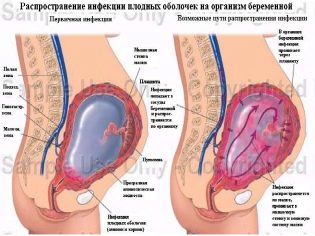Can body temperature rise and what to do before birth?
The organism of the future mother is undergoing a lot of changes. Muscle tone, hormones, changes the volume of circulating blood. The most large-scale changes start shortly before giving birth, because a woman will have to endure a responsible and very energy-intensive period. Late in the late period the temperature of the body scares pregnant women, because it may well be the reason for refusing to be hospitalized in the usual department and the reason for giving birth in the observational department of the hospital.
In this article we will look at the main causes of this phenomenon and find out if the temperature rise always indicates the presence of certain problems.
The effects of stress and experiences
No matter how much pregnant women say on the courses of future mothers and in consultation about the need to be calm and ready for childbirth, women usually do not maintain complete peace of mind. Excitement, feelings, fear of childbirth - all this creates very real prerequisites for increasing body temperature. And the closer to the date of birth, the stronger the excitement can be. From this point of view, an elevated body temperature before childbirth may well be a physiological response to a psychological factor.
This psychogenic temperature usually rises to 37.0-37.5 degrees, does not last long, and is often accompanied by chills. Such feelings can cause stress hormones in the human body.
What to do, it is clear without any explanation. You need to try to relieve stress, take a shower, calm down, switch to other thoughts, watch your favorite movie, go for a walk. In general, to do something that will help you to forget about feelings and fear for a while, and to tune in a creative way - very soon the baby will be born, and it will be really beautiful and right.
Enhance before giving birth
The temperature can rise just a few days before the birth, and then it, together with other "forerunners" can be regarded as a sign of the imminent onset of labor activity.
Before giving birth, the placenta and pituitary gland begin to produce oxytocin, a hormone necessary for full-fledged contractions. Progesterone is declining. In response to changes in the hormonal background, the body may well produce a thermal reaction, the thermometer will show up to 37.5 degrees.
No need to worry. If there are no other complaints and signs of disease, this temperature does not need to be reduced or treated. When enrolling with her at the maternity hospital at the discretion of the doctor, a woman may well go not to the observational department, which pregnant women are so afraid of, but to the usual generic.
For reasons of illness
The increased temperature in pregnant women cannot be ignored, if only because it can be an indicator of the presence of an infectious or inflammatory process in the body, which is extremely undesirable during childbirth. Immunity during childbearing is weakened, it is artificially suppressed by progesterone to ensure that the fetus is bearing to avoid its rejection. Therefore, before giving birth, a woman becomes a convenient target for viruses and bacteria of all categories and colors.
It is possible that the temperature rises due to viral infection. SARS can be picked up anywhere, in case of a viral disease, not only does the temperature rise, but it also lays the nose, has a headache, has a sore throat, and a cough may appear. The temperature rises above 38.0 degrees.
The manifestation of urogenital infection is also accompanied by high fever and pain when urinating, a change in the quantity and color of urine, and its unusual smell.
The most dangerous infection is inside the uterus. Intrauterine infections are not as rare as we would like. Raising the temperature above 37.5 degrees and keeping it at this level for a long time and above, without signs of a cold, may well be a sign of intrauterine infection, which is extremely dangerous for the life of the woman and her child.
If intrauterine infection is detected, if there is still time before delivery, treatment may be prescribed.
If childbirth should occur from day to day, a woman cannot be prescribed a cesarean section, if the infection affects the vagina, cervix, and in cases where the fetus after infection has significantly worsened.
How and when to treat?
If a woman complains of a fever, the doctor is obliged to examine her - take a blood test, do an ultrasound, take a smear of the vaginal flora for analysis, do a general urine test. In the absence of signs of disease, treatment is not prescribed, since the rise in temperature is considered physiological. Such a reaction of the body before childbirth, according to statistics, is characteristic of approximately 15% of pregnant women.
If the causes of the temperature are still painful, try to eliminate them before birth. Childbirth in itself is a big burden on the female body. If there is an opportunity not to exacerbate this load, why not use it?
With ARVI, a woman is prescribed plenty of drink, bed rest, fresh juices and fruits, and healthy sleep. Drugs in this case do not prescribe or recommend symptomatic drugs - apart from the common cold, cough or headache. The doctor should choose medicines taking into account the "interesting" position of the patient.
Genital, urinary infections require treatment with antibacterial drugs. Before birth, antibiotics do not have such a strong teratogenic effect on the fetus, as in the third trimester. As prescribed by the doctor, they may well be used to stabilize the condition of the future mother.
Preventive measures
Before giving birth you should not visit crowded places, it threatens with a viral disease, which is now completely unnecessary. Also, you should not refuse vaccinations against flu - pregnant women and babies are given special vaccines that are free from impurities. Even if the vaccinated woman gets the flu, the illness will be more mild without serious complications.
For the prevention of intrauterine infection, it is important to remember that after the discharge of the mucous plug, water, at the beginning of the preparation of the cervix for childbirth, sexual contact, swimming in the pool, and taking a bath, in order to prevent infection in the genital tract, and from there - into the uterine cavity.
Shortly before giving birth, you should calm down, pull yourself together, turn to a psychologist if you cannot cope with anxiety yourself. Do not forget about taking vitamins, good nutrition and rest.
How to properly prepare for childbirth, even if there is a temperature, the specialist in the next video tells.

















